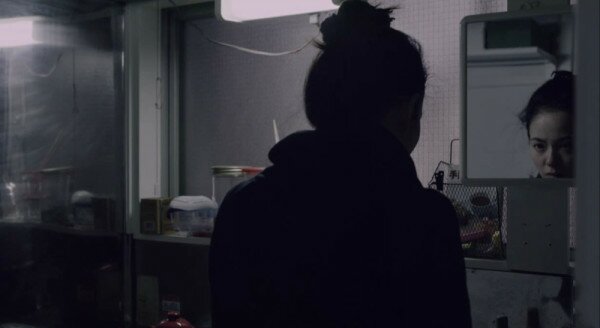Ayako is young, mid-20s woman who works in a grey, flat and rather dull Tokyo office. She has enough authority to add some level of significance to her work, but not enough to give her real control over the direction of her life. Ayako lives at home with emotionally reserved father (Ken Mitsuishi), a TV/Film editor.
One night, while travelling home after work, Ayako meets Yukari, a former classmate, who works directing traffic on a construction site. Yukari complains that the job is dull. To stave off boredom, she sings to herself, to pass the time. Ayako offers to find better employment for Yukari at her office. But, what Yukari didn’t realise is taking the job will mean reporting to Ayako.
Both women wear the same kind of grey, bland corporate attire, but Yukari never manages to look as sharp as Ayako. Moreover, Ayako has to chide Yukari for using informal language in the office and making too many mistakes in her work. In time, Yukari finds the work menial and is soon singing to herself, again.
Once Ayako tells Yukari’s laid-back slacker boyfriend (Ryo Nishihara) about Yukari’s romantic past the drama becomes asphyxiatingly tight and by the time Nagata (Seiji Nozoe), a well-meaning fool, intervenes it becomes clear the story will end badly.
Forma is for the 80 minutes or so of its 145 minute run time, a dark, slow building and rather tense experience. The lack of haste or resolution in the story-telling both draws us in and alienates us.
But, after this, Forma does something quite extraordinary. Having ambled along in a linear fashion, the narrative suddenly shifts, retraces its steps, then retells the story from a different perspective, then does this again, in an even sharper way.
The asymmetry of this should feel disjointed, but in fact the opposite happens; like a Fibonacci Spiral, the series of perspective transfers feel perfectly balanced.
Then we arrive at the quite brilliant climax; a single 24 minute scene, shot in one take. Of course, I won’t give away what happens, but it is one of the most startling and haunting cinematic moments of the year.
The shame is it takes Forma so long to get there. I suspect many viewers would struggle to stay with the story past the opening hour or so. Forma is well composed, shot in an engaging low key way, with some bold, patient, fixed camera scenes. These really evoke the mundane charm of Tokyo. And, the two lead actors, Emiko Matsuoka and Nagisa Umeno do really well. But, it all moves at an eye-wateringly slow pace.
And, Forma is a very subtle, dialogue heavy film. There is a lot of detail (and humour) that might be lost on viewers not familiar with Asian and, in particular Japanese custom. The men in the film come off as somewhat weak, effeminate and unable to really influence their environment and the two women are often hard to sympathise with as well.
Forma is Writer/Director Ayumi Sakamoto’s first feature film and it took 6 years of on and off struggle to complete. Sakamoto’s strengths as a film-maker are clear and one can imagine there being better work to come. Despite the issues of pace and length, Forma is an admirable and challenging film, which I hope will be seen in festivals and good cinemas outside Japan.
